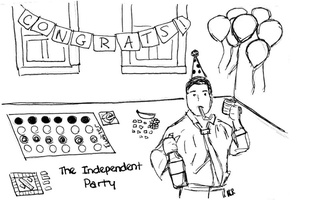The room of Kathryn C. Reed ’13 is a daily reminder of why she will attempt to run 100 miles on a treadmill between Sept. 9 and Sept. 15.
The Tanzanian fabrics, baskets, and carvings, along with photographs from her travels, are keepsakes that remind her of the people she taught about HIV for the past two summers. Her 100-mile run is a means to raise money for further HIV education in the African nation, where she first travelled last summer as a volunteer with Support for International Change.
Reed, a Crimson Magazine chair, is soliciting pledges for every mile she runs to raise money for everything from condoms and soap to HIV testing and health workers’ salaries. Donations have already exceeded $500, a sum she hopes to double, and her efforts will overlap with fundraising efforts in Tanzania, where SIC staff are planning to run a 5K on Sept. 9.
“She’s leading the charge,” said Teresa A. Skelly ’14, a fellow SIC volunteer who will also be working on fundraising this fall. “She made us all want to come back.”
SIC enlists volunteers from the United States and England to teach about HIV in Tanzanian communities in collaboration with local teaching partners. A sociology concentrator, Reed had no science background but had taken Swahili to fulfill her language requirement and so that she could travel to Africa.
With SIC, Reed taught audiences of all ages about the basic science behind the virus, helped dispel myths about HIV transmission, and encouraged condom use. Two of the biggest misconceptions are that condoms and everyday interactions like shaking hands spread HIV, she said.
“A lot of people will say that when you leave a condom to dry in the sun, you can see the worms,” Reed said. “[But that] is just the lubricant drying.”
There is still a lot of stigma associated with the disease, according to Reed, and many people believe that those who test positive for the virus are only trying spread HIV to others.
Reed said she hopes to average about 15 miles a day, distributed between two to three running sessions, in order to repeat the 100-mile feat she first performed last J-term. She sees the challenge as a natural way to support a place she repeatedly said feels like “home.”
One of her mantras is a Swahili saying that translates roughly to, “Slow slow is the way to go, hurry hurry has no blessing.”
“I think it many ways these runs will be like what we’re doing in Tanzania to fight HIV,” she said. “You don’t end HIV in a single awareness campaign, and I’m not going to complete 100 miles in a single run.”
—Staff writer Radhika Jain can be reached at radhikajain@college.harvard.edu.
Read more in News
Alleged Rapes Prompt ConcernRecommended Articles
-
Gordon-Reed Wins MacArthur GrantThe MacArthur Foundation announced yesterday morning that population geneticist Carlos D. Bustamante ’97 and Harvard professor Annette Gordon-Reed have been named 2010 MacArthur Fellows.
-
American Academy of Arts and Sciences Elects 20 from HarvardTwenty Harvard affiliates were elected last week to the American Academy of Arts and Sciences, one of the most prominent honorary societies in the country.
-
 Lou Reed, Metallica, and an Unholy Racket
Lou Reed, Metallica, and an Unholy Racket -
 Party Politics
Party Politics -
 Harvard Survives Wildcat Challenge
Harvard Survives Wildcat Challenge -
Notebook: Turnovers Tee Up Harvard DominanceThe Crimson first-team defense forced four turnovers to lead the team to a win in its final non-conference game of the season.













